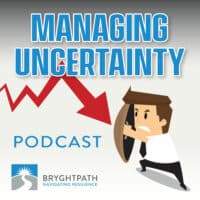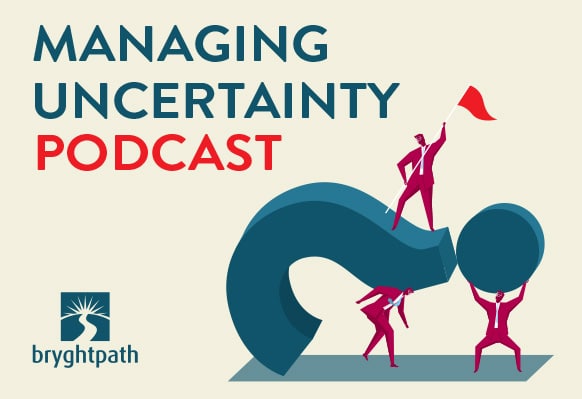
In this episode of the Managing Uncertainty Podcast, Bryghtpath Principal & Chief Executive Bryan Strawser reflects on 5 moments that shaped his career and influenced his path as a business continuity and crisis management professional.
Related Episodes & Blog Posts
- Blog Post: Inside Bryghtpath: Who quits a large corporation for a company in Minnesota with a team of four?
- Episode #116: Tools We Use At Bryghtpath (2021 Edition)
- Episode #136: How coaching can help your business continuity and crisis management program
- Episode #138: Reflecting on our Top Episodes of 2021
Episode Transcript
Hello and Welcome to the Managing Uncertainty Podcast. This is Bryan Strawser, Principal and Chief Executor at Bryghtpath. And in this week’s edition of our podcast, I’d like to talk a little bit about five moments that have really helped shape my career as a business continuity and crisis management professional and how these have really influenced the path that I’ve been on and the way that I have thought about the things that I do, day-in and day-out, here at Bryghtpath.
The first pivotal moment in my career when it comes to crisis management and business continuity, was 2004. I was living in Boston at the time, working for a large retailer where I spent the first two decades of my career. And I was the security leader for most of the New England market. We were coming up on three years after 9/11. And those attacks were still on the minds of public safety leaders throughout the United States.
And Boston was chosen to host the first major political convention following 9/11. And that was the 2004 National Democratic Convention which was held at what was then called the Fleet Center. Now it’s TD Banknorth Garden, TD Bank Garden, where the Boston Celtics and the Boston Bruins play right in downtown Boston. And obviously, there was going to be a lot of focus on this event because it was this large gathering that would take up most of the hotel space. There would be protests. There was going to be a lot of challenges and Boston, not the easiest place in the world to get around.
Because of the threat that everyone perceived, one of the challenges that was noticed about this particular venue is that the foundational walls of the facility, the place the convention would be, were within a few feet of Interstate 93’s tunnel through downtown Boston what we would know back then as the Big Dig, this sinking of the interstate under the city. And so, the Secret Service who was in charge of the planning for this event with the US Department of Homeland Security, decided that Interstate 93 would have to be closed during the convention which meant that the feeder roads had to be closed which meant that the surface streets had to be closed. And then the next thing you knew, there would be a good chunk of the day where you literally couldn’t get around the city of Boston.
And all of this was on top of the potential for disruption, the likelihood of a potential terrorist attack, and the other disruptions that go along with a large political convention. The protests and the opposing sides, political sides, and partisanship, and things that existed even back in 2004. At the time, my company did not have a centralized crisis management capability and so we had to do a lot of this planning locally which fell under my responsibilities as security leader.
So we spent months planning for this event. We made a lot of contingency plans. We executed quite well and fortunately, nothing happened. That turned out to be a pretty pivotal moment in my career. Not just because I had learned a lot about crisis management and business continuity planning, but I also was asked to then consider coming to headquarters here in Minnesota to be a part of a new crisis management team that the organization was creating. And ultimately, I took that lateral move to headquarters, leaving my 11 years of field security experience and coming to headquarters which turned into the rest of my career now, having been focused on crisis management and business continuity. So pretty unintentional move originally but lead to a little bit of a career shift and specialization in this part of the broader security industry for me.
I was relatively new in that role in 2005, relocating here to Minnesota and adapting to different weather, corporate instead of a stores environment, and everything that went along with that when Hurricane Katrina hit around Labor Day, 1st of September, in 2005. Significant impact, of course, to Louisiana and surrounding states. Huge impact to the retailer I was working for due to the number of stores and the presence there. And a good example to me of what happens when you don’t have good processes in place. My company had not yet, at the time, built out a robust crisis framework. We didn’t have a large crisis management team. We didn’t have a good cross-functional capability. A lot of struggles. But we powered through that and ultimately spent time investing in those things, helping us build out those capabilities and getting to a better place down the road.
I went off and did some other things for a few years there, leaving the crisis management world behind and moving to a different part of the corporate security team and really working on technology and strategy innovation and a few other things. Come 2009, my employer was embroiled in a proxy contest for control of the board of directors and I was asked to take on a special project assignment to focus on assisting our executive team in managing through this proxy contest. And at the time, this was the largest proxy contest in US history. There were millions of dollars spent by both sides in this contest. Pretty high stakes.
I was told coming into this that if we didn’t prevail, I was probably not going to get to stick around in the organization but if we did prevail, there would probably be some big payoff in terms of movement within the organization to some dream roles. So how could I say no to that? And was able to select and pick a team across the organization. I had a lot of executive interaction. And ultimately, our organization prevailed in this proxy contest against the odds. We weren’t expected to do so. And were able to run the table on this activist investor.
I learned a ton through this about organizing reputational campaigns, about working under pressure, about presenting and interacting with senior executives and really getting comfortable with something that I had struggled with, showing the level of confidence that was really needed in those situations. And I did, I was able to name my own position after this and wound up as the new leader for global crisis management and business continuity and intelligence and became a direct report of the Chief Security Officer as a result of that effort. Now that wasn’t just because of the effort. I obviously had grown professionally in a lot of ways. But it really helped me think about what I wanted to do and position me for that success.
In 2012, when I was in that role, my company had an active shooter situation occur at a corporate headquarters location in Minnesota. We’ve talked about this before here on our podcast with some of my former employees that were there with us that day and what all of us went through. We were fortunate in that this turned out to be a false alarm but I spent several hours that day as police were dealing with the situation and working their way through the building to ensure everyone was safe, I spent a good portion of that day mentally preparing myself for the likelihood that there would be fatalities to our organization and that those fatalities could potentially involve people that I knew and cared about a lot as friends and colleagues. And we learned a lot through that situation. Not just as a company about how to prepare and manage and work through those situations, but I learned a lot about leading in that level of stress and keeping my team and my company focused on what needed to happen.
And then lastly, in 2014, there was a confluence of events for me where my boss that I had worked for for 17-some years was retiring. Where I was celebrating my 20th and then my 21st anniversary with the same employer. And I was also finishing my MBA at the University of Minnesota. And it really caused me to think about transitions and what I wanted to do for the next decade or two of my life. And that lead me to the decision to leave following graduation and take the summer off in 2014. And then that Fall, start Bryghtpath. And it’s a decision that I don’t regret in the least. It has afforded me a whole different level of opportunity and freedom to do the things and focus on the things that I truly care about. Work with a great group of individuals and be able to work with fantastic clients and help them as they think about their own journey of resilience, about managing uncertainty and disruption, and help them through their critical moments.
So these were five important moments for my own career. I hope you found some inspiration and some thoughts through those that will help you on your own journey. That’s it for this edition of the Managing Uncertainty Podcast. We’ll be back next week with another new episode. Be well.

